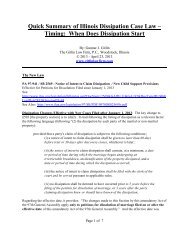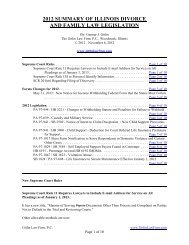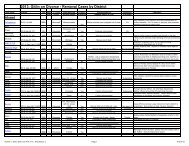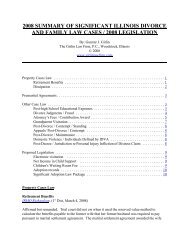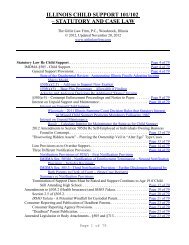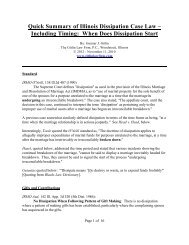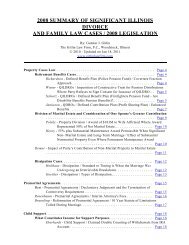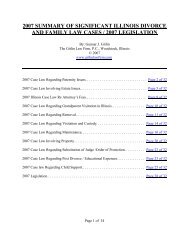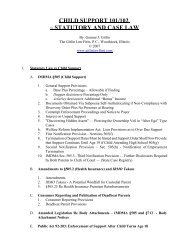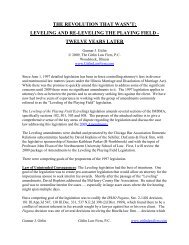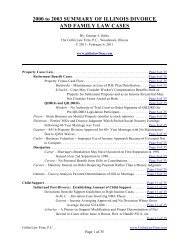Gitlin Law Firm 2010 Illinois Divorce and Paternity Case and ...
Gitlin Law Firm 2010 Illinois Divorce and Paternity Case and ...
Gitlin Law Firm 2010 Illinois Divorce and Paternity Case and ...
Create successful ePaper yourself
Turn your PDF publications into a flip-book with our unique Google optimized e-Paper software.
McCann postdissolution proceeding.<br />
The Supreme Court decision next addressed the Confidentiality Act in Section B <strong>and</strong> stated:<br />
This court has repeatedly recognized that the Confidentiality Act constitutes “a<br />
strong statement” by the legislature about the importance of keeping mental health<br />
records confidential. Reda, 199 Ill. 2d at 60; Norskog, 197 Ill. 2d at 71-72. We<br />
expressly reaffirm this unmistakable legislative intent. However, the Confidentiality<br />
Act simply does not apply in the present case because Dr. Amabile <strong>and</strong> plaintiffs<br />
were not engaged in a therapeutic relationship.<br />
[W]e conclude that section 604(b) of the Marriage Act does not distinguish mental<br />
health personnel from other 604(b) professional personnel. Further, although section<br />
605 provides defendants with a remedy, section 604(b) confines Dr. Amabile’s<br />
report to the McCann postdissolution proceeding. Additionally, the<br />
Confidentiality Act does not apply in this case.<br />
We observe that, in dicta, the appellate court discussed possible remedies that<br />
plaintiffs could pursue as an alternative to a Confidentiality Act claim. 396 Ill. App.<br />
3d at 791. While we have reviewed the record in the interests of judicial economy<br />
<strong>and</strong> the need to reach an equitable result (Bright, 166 Ill. 2d at 208), we find that the<br />
appellate court’s suggested remedies fall outside the proper scope of our review of<br />
the certified question. See Vision Point of Sale, Inc. v. Haas, 226 Ill. 2d 334, 358<br />
(2007).<br />
While a close call, I agree Justice Kilbride's dissent. He urges:<br />
The plain language of the Confidentiality Act shows that the certified question should<br />
be answered affirmatively. Specifically, section 10 of the Confidentiality Act, entitled<br />
“Disclosure in civil, criminal, <strong>and</strong> other proceedings,” identifies several exceptions to<br />
the Confidentiality Act’s blanket prohibition on the disclosure of mental health<br />
information. Critically, section 10(a)(4) addresses the precise issue presented in the<br />
certified question, the disclosure of mental health information in a court-ordered<br />
examination, providing that: “Records <strong>and</strong> communications made to or by a therapist<br />
in the course of examination ordered by a court for good cause shown may, if<br />
otherwise relevant <strong>and</strong> admissible, be disclosed in a civil, criminal, or administrative<br />
proceeding in which the recipient is a party or in appropriate pretrial proceedings,<br />
provided such court has found that the recipient has been as adequately <strong>and</strong> as<br />
effectively as possible informed before submitting to such examination that such<br />
records <strong>and</strong> communications would not be considered confidential or privileged.<br />
Such records <strong>and</strong> communications shall be admissible only as to issues involving the<br />
recipient’s physical or mental condition <strong>and</strong> only to the extent that these are germane<br />
to such proceedings.” (Emphasis added.) 740 ILCS 110/10(a)(4).<br />
Thus, the plain language of section 10(a)(4) allows for disclosure of mental health<br />
<strong>Gitlin</strong> <strong>Law</strong> <strong>Firm</strong>, P.C.<br />
Page 20 of 49<br />
www.<strong>Gitlin</strong><strong>Law</strong><strong>Firm</strong>.com




